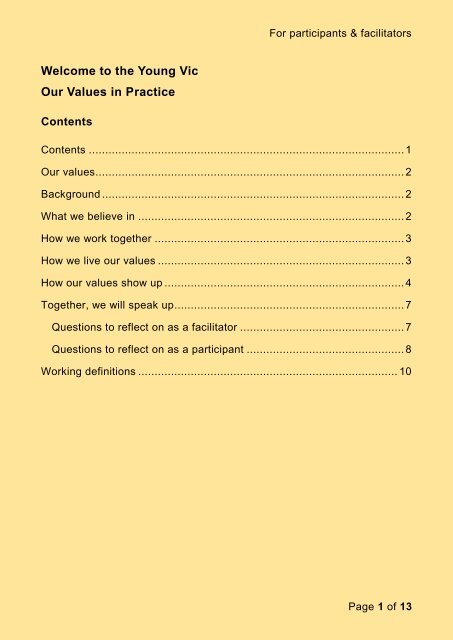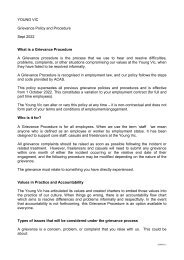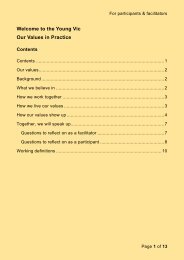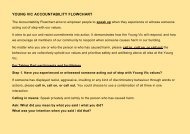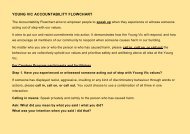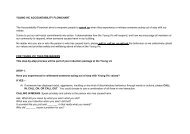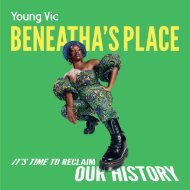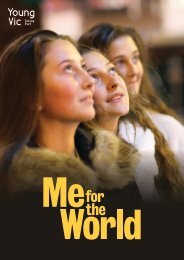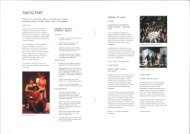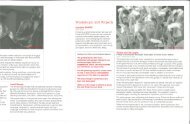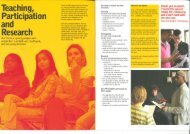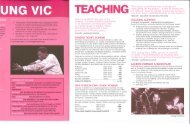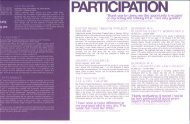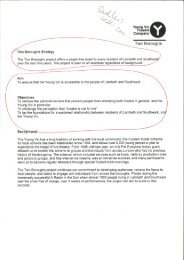Values in Practice
You also want an ePaper? Increase the reach of your titles
YUMPU automatically turns print PDFs into web optimized ePapers that Google loves.
For participants & facilitators<br />
Welcome to the Young Vic<br />
Our <strong>Values</strong> <strong>in</strong> <strong>Practice</strong><br />
Contents<br />
Contents ................................................................................................ 1<br />
Our values .............................................................................................. 2<br />
Background ............................................................................................ 2<br />
What we believe <strong>in</strong> ................................................................................. 2<br />
How we work together ............................................................................ 3<br />
How we live our values ........................................................................... 3<br />
How our values show up ......................................................................... 4<br />
Together, we will speak up ...................................................................... 7<br />
Questions to reflect on as a facilitator .................................................. 7<br />
Questions to reflect on as a participant ................................................ 8<br />
Work<strong>in</strong>g def<strong>in</strong>itions ............................................................................... 10<br />
Page 1 of 13
For participants & facilitators<br />
Our values<br />
We believe theatre is at its best when everyone participates.<br />
We are driven by relentless curiosity and debate.<br />
We believe <strong>in</strong> pioneer<strong>in</strong>g and lead<strong>in</strong>g <strong>in</strong>to the unknown.<br />
We are led by the creativity of our people and the limitless possibility<br />
of imag<strong>in</strong>ation.<br />
We collaborate: work<strong>in</strong>g together to achieve shared goals.<br />
We prioritise k<strong>in</strong>dness, we lead with heart, with care, and with the<br />
wellbe<strong>in</strong>g of our staff, our participants and theatre makers and<br />
audience.<br />
We are committed to openness rooted <strong>in</strong> trust.<br />
Background<br />
We want the Young Vic to be a place of welcome, joy and safety for<br />
everyone who works with us either as someone lead<strong>in</strong>g a project, a<br />
participant/artist or member of staff.<br />
We have created this code <strong>in</strong> response to our anti-racism work so that we<br />
can clearly express our values and how they show up <strong>in</strong> what we do and<br />
how we work with people. It is evolv<strong>in</strong>g as we learn and has been created<br />
with the <strong>in</strong>put from our staff and our participants.<br />
What we believe <strong>in</strong><br />
We have a positive and open approach that seeks out opportunities and<br />
new ways of th<strong>in</strong>k<strong>in</strong>g. At the heart of how we work together is to listen,<br />
respect, and learn, to ask questions, to treat everyone with equity and not<br />
to make assumptions.<br />
Page 2 of 13
For participants & facilitators<br />
How we work together<br />
We are excited that you are lead<strong>in</strong>g or participat<strong>in</strong>g <strong>in</strong> a Creators Program<br />
workshop, project, or production.<br />
Our ongo<strong>in</strong>g goal is zero tolerance for disrespectful behaviours, sexual<br />
harassment, sexual misconduct and systemic racism and bully<strong>in</strong>g. These<br />
behaviours are contrary to who we are and what we aspire to be.<br />
The theatre work that we create at the Young Vic can and should be<br />
challeng<strong>in</strong>g, experimental, exploratory, and bold. Artistic freedom of<br />
expression is essential. For these th<strong>in</strong>gs to happen, though, the creative<br />
space must be safe.<br />
How we live our values<br />
To create this supportive space, we have thought about the way <strong>in</strong> which<br />
our values take shape and are realised. There are ways of work<strong>in</strong>g and<br />
behav<strong>in</strong>g that we can expect of each other and clear ways to challenge<br />
each other when we don’t create a space that feels safe, welcom<strong>in</strong>g and<br />
creative.<br />
What we will practically provide:<br />
Space for everyone to express themselves.<br />
Schedules and work<strong>in</strong>g processes that prioritise mental and physical<br />
wellbe<strong>in</strong>g.<br />
Use of check-<strong>in</strong>s and check-outs as appropriate for the activity.<br />
Invitation to express pronouns.<br />
Clear procedure when you encounter an <strong>in</strong>dividual or a situation<br />
where any of the Young Vic values are not <strong>in</strong> practice. The process<br />
is clear, easy and risk-free.<br />
Page 3 of 13
For participants & facilitators<br />
As appropriate to the project, built-<strong>in</strong> reflection po<strong>in</strong>ts so that<br />
adjustments and changes can be made to create a fluid process.<br />
An environment where participants, staff, artists can provide<br />
feedback and know that it will be listened to, acted upon and<br />
followed up.<br />
We will regularly revisit our practices, ideas and actions. This<br />
document will live and change as we learn and develop.<br />
We actively make space and time for projects to change especially<br />
when the change is related to people’s identity.<br />
In turn, we ask you to:<br />
Embrace and put <strong>in</strong>to practice our values and approach.<br />
Take jo<strong>in</strong>t responsibility for creat<strong>in</strong>g a space where discrim<strong>in</strong>atory<br />
language, hate speech, abuse, or harassment is not tolerated and is<br />
called out.<br />
How our values show up<br />
We believe theatre is at its best when everyone participates<br />
The Young Vic belongs to everyone.<br />
We are welcom<strong>in</strong>g.<br />
We lead with generosity.<br />
We believe <strong>in</strong> togetherness and the power of the community and cooperation.<br />
We want to tell a range of stories that celebrate a variety of voices.<br />
We are open to new ideas, approaches, and perspectives.<br />
Page 4 of 13
For participants & facilitators<br />
We create safe and open spaces where people can confidently and<br />
safely express what they th<strong>in</strong>k, feel and need for a space to be<br />
<strong>in</strong>clusive.<br />
We treat everyone equally, with honesty and respect.<br />
We support freedom of speech that is compassionate and<br />
demonstrates understand<strong>in</strong>g of different perspectives.<br />
We practice active listen<strong>in</strong>g.<br />
We are driven by relentless curiosity and debate<br />
We move towards what we don’t know or understand.<br />
We believe that stories help us to explore the world and to see it with<br />
fresh eyes.<br />
We understand more about the world by engag<strong>in</strong>g with a wide<br />
spectrum of views.<br />
We are excited to learn from difference and to debate openly,<br />
honestly and respectfully.<br />
We believe <strong>in</strong> pioneer<strong>in</strong>g and lead<strong>in</strong>g <strong>in</strong>to the unknown<br />
We <strong>in</strong>novate how we make theatre and how we share it with an<br />
audience.<br />
We tell stories that surprise, challenge and reflect contemporary<br />
society both local and global.<br />
We are led by the creativity of our people and the limitless possibility<br />
of imag<strong>in</strong>ation<br />
We look at what is possible and celebrate ambition.<br />
We push, we <strong>in</strong>novate, we challenge ourselves and make space for<br />
the unexpected<br />
Page 5 of 13
For participants & facilitators<br />
We make the most of opportunities.<br />
We collaborate; work<strong>in</strong>g together to achieve shared goals<br />
We are stronger by engag<strong>in</strong>g with and reflect<strong>in</strong>g the great diversity<br />
of society, past and present, onstage and off.<br />
We embrace and learn from everyone’s experiences.<br />
We believe there is strength <strong>in</strong> diversity of thought and experience –<br />
when we listen to each other and engage <strong>in</strong> dialogue our collective<br />
knowledge means that we <strong>in</strong>novate and make change.<br />
We prioritise k<strong>in</strong>dness, we lead with heart, with care, and with the<br />
wellbe<strong>in</strong>g of our staff, our participants and theatre makers and<br />
audience<br />
We celebrate successes.<br />
We give honest, constructive and creative feedback so that we can<br />
reflect on what we have done and always learn and evolve.<br />
We accept feedback with an open heart without defensiveness.<br />
We create patterns of work<strong>in</strong>g that centre life and work commitments<br />
and ensure we can all do our best work and br<strong>in</strong>g our full selves.<br />
We value patience and give time to get to know people so that they<br />
can express themselves fully.<br />
We are committed to openness rooted <strong>in</strong> trust<br />
We believe <strong>in</strong> reflect<strong>in</strong>g our values <strong>in</strong> what we say, how we say it,<br />
and <strong>in</strong> what we do.<br />
We believe <strong>in</strong> be<strong>in</strong>g held to account when we’ve fallen short of our<br />
commitments and apologis<strong>in</strong>g when we’ve not upheld our values.<br />
We will share context for decisions and actions.<br />
Page 6 of 13
For participants & facilitators<br />
We know that mistakes will happen, and we will learn from them and<br />
grow stronger as a result of them.<br />
We support our staff to grow when th<strong>in</strong>gs don’t go right.<br />
Information shared with us is treated with utmost confidentiality. This<br />
trust is central to collaboration and <strong>in</strong>novation.<br />
Together, we will speak up<br />
We will not always fully realise our ideals and values. There will be times<br />
when resources, human error, or circumstances mean that we are not able<br />
to uphold everyth<strong>in</strong>g we aspire to. When this happens, we have<br />
processes that ensure we are open, reflective, and receptive to challenge<br />
and change.<br />
You can f<strong>in</strong>d the Young Vic Accountability Flow Chart here. The chart<br />
aims to empower people to speak up when they experience or witness<br />
someone act<strong>in</strong>g out of step with our values. No matter who you are or who<br />
the person is who has caused harm, please call <strong>in</strong>, call on or call out the<br />
behaviour so we collectively uphold our values and prioritise safety and<br />
wellbe<strong>in</strong>g above all else at the Young Vic.<br />
Speak<strong>in</strong>g up is crucial to our culture and is a liv<strong>in</strong>g example of our values.<br />
Speak<strong>in</strong>g up when someth<strong>in</strong>g doesn’t feel right demonstrates our <strong>in</strong>tegrity<br />
and courage to do the right th<strong>in</strong>g. Speak<strong>in</strong>g up helps us to prevent<br />
mistakes and foster <strong>in</strong>novation. It shows we care about each other and<br />
helps us to deliver high quality outcomes.<br />
Questions to reflect on as a facilitator<br />
We can check <strong>in</strong> with ourselves as those lead<strong>in</strong>g a project by ask<strong>in</strong>g<br />
ourselves some questions along the life-span of a project.<br />
Page 7 of 13
For participants & facilitators<br />
Have I created a mechanism that ensures people can speak and be<br />
heard? Have I used open questions, and created moments for<br />
people to contribute? Have I really listened today?<br />
Have I created an environment <strong>in</strong> which the group has respected<br />
each other’s chance to speak and be heard?<br />
Have I positively used my power and <strong>in</strong>fluence?<br />
Has the volume of my voice, or my physical presence prevented<br />
someone from feel<strong>in</strong>g free to express themselves?<br />
Have I rema<strong>in</strong>ed silent when I should have called out or called <strong>in</strong><br />
someone’s behaviours or actions that have caused harm, or called<br />
on someone to advocate?<br />
Has there been a chance for the group to contribute to the structure<br />
of the session, such as more breaks, more time to explore ideas,<br />
etc.?<br />
Have I been open to learn new th<strong>in</strong>gs, listen to new perspectives?<br />
Questions to reflect on as a participant<br />
We can check <strong>in</strong> with ourselves as those tak<strong>in</strong>g part <strong>in</strong> a project by ask<strong>in</strong>g<br />
ourselves some questions along the life-span of a project.<br />
Have I really listened today? Have I honoured the mechanism put <strong>in</strong><br />
place for people to be heard?<br />
Have I given others <strong>in</strong> the group the chance to speak and be heard?<br />
Have I positively used my power and <strong>in</strong>fluence?<br />
Has the volume of my voice, or my physical presence prevented<br />
someone from feel<strong>in</strong>g free to express themselves?<br />
Have I rema<strong>in</strong>ed silent when I should have called out, called <strong>in</strong><br />
someone’s behaviours or actions that have caused harm, or called<br />
on someone to advocate?<br />
Page 8 of 13
For participants & facilitators<br />
Would I like to ask for changes <strong>in</strong> how we are work<strong>in</strong>g together as a<br />
group, for example more breaks, more time to explore ideas, etc.?<br />
Have I been open to learn new th<strong>in</strong>gs, listen to new perspectives?<br />
Page 9 of 13
For participants & facilitators<br />
Work<strong>in</strong>g def<strong>in</strong>itions<br />
Active listen<strong>in</strong>g<br />
When we talk about ‘active listen<strong>in</strong>g’, we’re talk<strong>in</strong>g about really listen<strong>in</strong>g<br />
not only to the words that someone is say<strong>in</strong>g, but also what those words<br />
are communicat<strong>in</strong>g. Active listen<strong>in</strong>g challenges ourselves to leave<br />
preconceived judgements or stereotypes out of our listen<strong>in</strong>g, and to really<br />
tune <strong>in</strong> to what the person speak<strong>in</strong>g is shar<strong>in</strong>g with us and approach<strong>in</strong>g<br />
that with a generosity of spirit.<br />
Equality<br />
Equality means giv<strong>in</strong>g everyone the same resources or opportunities – it<br />
does not allow for differences <strong>in</strong> people's circumstances, lived<br />
experiences, privileges or challenges.<br />
Equity<br />
Equity recognises that each person has different lived experiences,<br />
challenges, and privileges. Equity allocates resources and opportunities<br />
so that everyone can reach an equal outcome, but that may not be<br />
through an equal distribution of resources or opportunities.<br />
For example, if we gave everyone <strong>in</strong> the room the same set amount of<br />
money for their travel expenses, that would be equality – there is an equal<br />
division of resources. Equity acknowledges that for various reasons, some<br />
people may need more travel expenses to be able to attend. Equity<br />
recognises the socio-economic, political, and racial lived experience that<br />
impact how or if people can access resources and opportunities.<br />
Page 10 of 13
For participants & facilitators<br />
Generosity of spirit<br />
When we talk about a positive generous spirit, we mean welcom<strong>in</strong>g<br />
hear<strong>in</strong>g other peoples’ ideas, welcom<strong>in</strong>g other people shar<strong>in</strong>g their<br />
creativity, contribut<strong>in</strong>g our ideas and creativity, giv<strong>in</strong>g each other the<br />
benefit of the doubt. A generous spirit encourages leav<strong>in</strong>g judgement and<br />
preconceptions at the door and be<strong>in</strong>g open to learn<strong>in</strong>g new th<strong>in</strong>gs about<br />
people that we don’t know, or learn<strong>in</strong>g new th<strong>in</strong>gs about people we do<br />
know. We want to create the right environment for people to surprise<br />
themselves with the ideas, creativity and reflections they get to.<br />
Lived experience<br />
People will have a range of lived experiences, which could be about their<br />
identity, their circumstances, or their experiences of different systems.<br />
Sometimes <strong>in</strong> the creative process, people will share their lived<br />
experiences. Sometimes peoples’ lived experiences will directly <strong>in</strong>form<br />
their creative practice. People’s lived experiences will probably <strong>in</strong>directly<br />
<strong>in</strong>form their creative practices. We openly believe people. We commit to<br />
not judg<strong>in</strong>g or question<strong>in</strong>g whether their lived experience is true, because<br />
it’s not our place and because we haven’t lived their lives. We may have a<br />
perception of how a particular lived experience may affect the way a<br />
person behaves or carries themselves. We rem<strong>in</strong>d ourselves that’s a form<br />
of judgement and we are bas<strong>in</strong>g that on someth<strong>in</strong>g that we have not<br />
experienced ourselves.<br />
Pronouns<br />
Pronouns stand <strong>in</strong> for a name such as she/her, he/him, they/them.<br />
Page 11 of 13
For participants & facilitators<br />
Protected characteristics<br />
There are n<strong>in</strong>e protected characteristics, and it’s aga<strong>in</strong>st the law to<br />
discrim<strong>in</strong>ate aga<strong>in</strong>st someone because of their: age, disability, gender<br />
reassignment, marriage and civil partnership, pregnancy and maternity,<br />
race, religion or belief, sex, sexual orientation. This is written <strong>in</strong>to the<br />
Equality Act 2010.<br />
Racism<br />
Racism is prejudice, discrim<strong>in</strong>ation, or antagonism by an <strong>in</strong>dividual,<br />
community, or <strong>in</strong>stitution aga<strong>in</strong>st a person or people based on their racial<br />
or ethnic group, typically one that is a m<strong>in</strong>ority or marg<strong>in</strong>alized.<br />
Racism can be direct or <strong>in</strong>direct, a one-off or a series of <strong>in</strong>dividual,<br />
systemic, or organisational <strong>in</strong>cidents. It can be conscious or unconscious.<br />
Racism is harmful even if the person is unaware, they are discrim<strong>in</strong>at<strong>in</strong>g.<br />
Racism causes last<strong>in</strong>g harm, pa<strong>in</strong>, and distress, for no one more so than<br />
Black people and people from the Global Majority. Racism destroys the<br />
fabric of our society. Experienc<strong>in</strong>g racism has significant consequences on<br />
mental and physical health.<br />
Self-awareness<br />
When we talk about self-awareness, we’re talk<strong>in</strong>g about be<strong>in</strong>g alert to how<br />
we show up <strong>in</strong> a room or how we take up space. It’s normal and<br />
encouraged to br<strong>in</strong>g ideas, reflections, thoughts and your unique creativity<br />
<strong>in</strong>to the room and we don’t want to stifle that, but we do want to create a<br />
space <strong>in</strong> which all voices are heard. Be<strong>in</strong>g aware of which voices you do<br />
and don’t hear and be<strong>in</strong>g curious about why that may be is key. Whilst<br />
you’re participat<strong>in</strong>g <strong>in</strong> the workshop, it’s the job of the artist or facilitator to<br />
Page 12 of 13
For participants & facilitators<br />
lead on this and notice how space is be<strong>in</strong>g shared, as <strong>in</strong>dividuals we have<br />
a part <strong>in</strong> understand<strong>in</strong>g what we br<strong>in</strong>g <strong>in</strong>to a space. If we feel very<br />
confident about regularly shar<strong>in</strong>g our ideas, may that be because we’re<br />
used to be<strong>in</strong>g afforded the space to take personal and creative risk?<br />
Last updated October 2023<br />
Page 13 of 13


